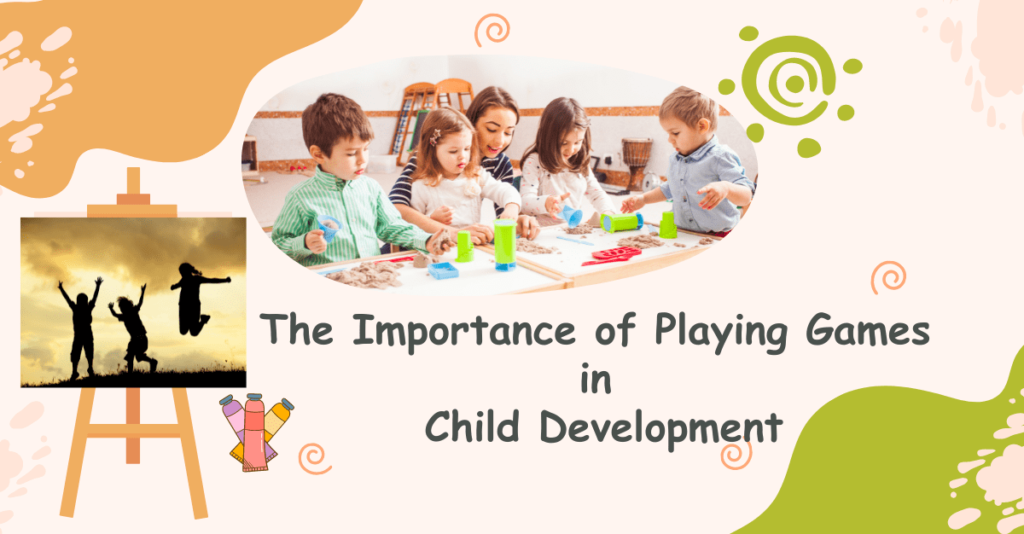Do you know the significance of games in the development of children? Many parents ignore its importance in child development and hardly associate it with learning.
For most people, learning is limited to memorizing the alphabet, counting, writing, etc., and play is only for fun. For these people, there is no learning involved while playing.
However, according to reports, playing games helps in learning. Children can learn through their experiences while playing.
Benefits Of Playing Games
Enhances Brain Development
There are different ways through which playing games can promote brain development. A child can understand the world differently and in a better manner and set the platform for their brain growth.
At birth, the brains of infants have an overabundance of brain cell connections (synapses). The overproduction of these allows information captured from the early years to build a base for brain growth.
Games like building blocks provide an environment to children that involves play, sensory play, and play toys with the perfect life experiences. A child loses their neuron connections in the absence of these activities.
According to a few findings, things like toys, games, and play have a positive effect on the brain of children. The cerebral cortex of the brain area processes higher cognitive thinking and gets benefits from environmental circumstances during play more than the rest of the part.
IMPROVED INTELLIGENCE
Providing a playful environment to a child helps in their intellectual development.
According to a study by the University of Arkansas, If you offer toys to infants regularly, it leads to higher IQs by the age of three.
Enhance Creative Thinking
A child’s creativity is enhanced through play activities. There is a direct relation between creative thinking and problem-solving skills. It refers to the thought process of finding various possible solutions to problems and new idea generation.
To prove the skills related to creativity are enhanced through activities,52 children who were aged between six to seven years were randomly selected by a researcher. The first activity assigned was related to simply copying text from a chalkboard and dough was given to the second group.
When asked to make a creative project for both groups a panel of ten judges found out that the projects made by the children belonging to the dough group have shown higher creative qualities compared to those in the board group.
Other studies have also shown improvement in problem-solving skills associated with free play or imaginative play.
.
There is no defined structure given to free play or independent play. These activities encourage children to design their game type according to their imaginative or creative thinking. For pretend play type a child imagines scenarios to act accordingly. These types of activities allow children to be creative.
Imagination instigates creativity and some studies have also found that creative children do have imaginary friends in childhood.
IMPROVE COMMUNICATION, VOCABULARY, AND LANGUAGE
There is an established link between early play activities and communication skills at the later stage. There was a study conducted to understand the relation between communication and play activities and for that, an infant playing with a toy was observed. They found out that after three months they possessed better language skills. The only thing the mother had to do was to name the toys.
Sixty-five kids were monitored in the classroom for over four weeks in the study, conducted by the University of Georgia. The presence of dramatic play resulted in enhancing the performance in reading, language, and writing.
Young children practice new vocabulary while indulging in role-play activities as they speak and understand what others have to say. While playing together Children respond to other’s words and actions to reach agreements.
IMPULSE CONTROL AND EMOTION REGULATION
Self-regulation is one of the most important skills for a child to be school ready. If a child has this skill he/she can wait for the turn, will not have the intention of grabbing things from other children, control their negative emotions, and will overcome the challenging activities.
SOCIAL DEVELOPMENT AND EMPATHY
Play activities are essential for enhancing social development in children. Children can cultivate social skills with the help of unstructured active play with either their parents, siblings, or peers. They play, pretend and negotiate with others and in turn enhance social skills.
Different activities give opportunities to children to learn socially acceptable behaviors as they play together. Children learn how to cooperate, follow the rules and develop self-control to get along with other people as they play together.
According to psychologists the amount and complexity involved in role-play activities promotes social skills, popularity in children, and positive social activity.
An essential element associated with play is empathy, which advances social skills. When these empathetic children will grow, they will have a better understanding of the feelings and beliefs of other people.
LIFE LESSONS
Play helps children develop problem-solving skills. During pretend-play activities, children act according to life’s problems. These activities help them overcome their struggles in their way. It provides ample opportunities for children to rehearse their skills and future social roles. They tend to learn to take on different perspectives, which will assist them in abstract thinking in future activities
STRENGTHEN RELATIONSHIPS WITH CARETAKERS AND PEERS
Parents develop strong bonds with their children while playing with them. Even simple games like hide and seek can be a special bonding moment for both. These interactions stimulate children’s brain development as they provide positive life experiences. These happy and playful moments are the most precious gifts you can give to your children.
Final Thoughts on Play
Preschools that consider the importance of play activities can give a better learning environment than other available alternatives. While selecting these schools, parents should pay attention to their classes and monitor if they are using the “play to learn” approach, and how much free play time is allowed. It is a good alternative for parents to create a Montessori home.
